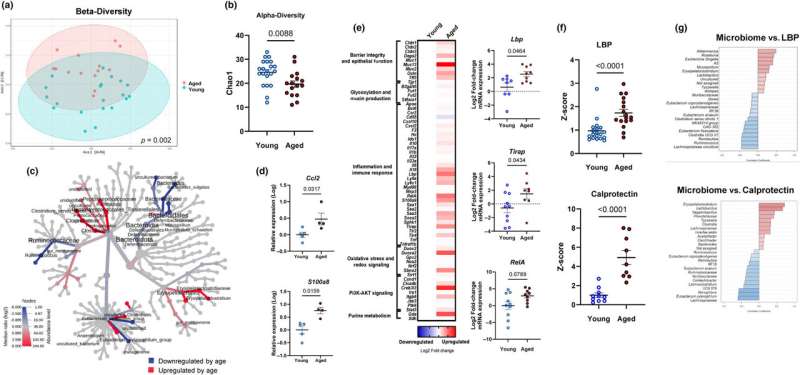This article has been reviewed according to Science X's editorial process and policies. Editors have highlighted the following attributes while ensuring the content's credibility:
fact-checked
peer-reviewed publication
trusted source
proofread
Gut microbes from aged mice induce inflammation in young mice, study finds

When scientists transplanted the gut microbes of aged mice into young "germ-free" mice—raised to have no gut microbes of their own—the recipient mice experienced an increase in inflammation that parallels inflammatory processes associated with aging in humans. Young germ-free mice transplanted with microbes from other young mice had no such increase.
The findings suggest that changes to the gut microbiome play a role in the systemwide inflammation that often occurs with aging, the researchers said.
Reported in the journal Aging Cell, the study also found that antibiotics caused longer-lasting disruptions in the gut microbiomes of aged mice than in young mice.
"There's been a growing consensus that aging is associated with a progressive increase in chronic low-grade inflammation," said Jacob Allen, a professor of kinesiology and community health at the University of Illinois Urbana-Champaign who led the new research with Thomas Buford, a professor of medicine at the University of Alabama at Birmingham.
"And there's a kind of debate as to what drives this, what is the major cause of the aging-induced inflammatory state. We wanted to understand if the functional capacity of the microbiome was changing in a way that might contribute to some of the inflammation that we see with aging."
Previous studies have found associations between age-related changes in the microbial composition of the gut and chronic inflammatory diseases such as Parkinson's disease and Alzheimer's disease. Some studies have linked microbial metabolism to an individual's susceptibility to other health conditions, including obesity, irritable bowel syndrome and heart disease. Age-related changes in the gut microbiome also may contribute to the so-called leaky gut problem, the researchers said.
"Microbiome patterns in aged mice are strongly associated with signs of bacterial-induced barrier disruption and immune infiltration," they wrote.
"The things that are in our gut are supposed to be kept separate from the rest of our system," Buford said. "If they leak out, our immune system is going to recognize them. And so then the question was: 'Is that a source of inflammation?'"
Many studies have compared the relative abundance and diversity of species of microbes in the gut, offering insight into some of the major groups that contribute to health or disease. But sequencing even a portion of the microbes in the gut is expensive and the results can be difficult to interpret, Allen said. That is why he and his colleagues focused on microbial function—specifically, how the gut microbiomes of aging mice might spur an immune response.
The team focused on toll-like receptors, molecules that mediate inflammatory processes throughout the body. TLRs sit in cellular membranes and sample the extracellular environment for signs of tissue damage or infection. If a TLR encounters a molecule associated with a potential pathogen—for example, a lipopolysaccharide component of a gram-negative bacterium—it activates an innate immune response, calling in pro-inflammatory agents and other molecules to fight the infection.
The researchers first evaluated whether the colonic contents of young and aged mice were likely to promote TLR signaling. They found that microbes from aged mice were more likely than those from young mice to activate TLR4, which can sense lipopolysaccharide components of bacterial cell walls. A different receptor, TLR5, was not affected differently in aged or young mice. TLR5 senses a different bacterial component, known as flagellin.
Young germ-free mice transplanted with the microbes of aged mice also experienced higher inflammatory signaling and increased levels of lipopolysaccharides in the blood after the transplants, the team found.
This finding provides "a direct link between aging-induced shifts in microbiota immunogenicity and host inflammation," the researchers wrote.
In other experiments, the team treated mice with broad-spectrum antibiotics and tracked changes in the microbiomes during treatment and for seven days afterward.
"One of the most interesting questions for me was what microbes come back immediately after the treatment with antibiotics ends," Buford said. And in the mice with aged microbiota in their guts, "these opportunistic pathogens were the most quick to come back."
"It appears that as we age our microbiome might be less resilient to antibiotic challenges," Allen said. "This is important because we know that in the U.S. and other Western societies, we're increasingly exposed to more antibiotics as we age."
The study is an important step toward understanding how age-related microbial changes in the gut may affect long-term health and inflammation, the researchers said.
Co-authors of the study also included Illinois postdoctoral researcher Elisa Caetano-Silva; U. of I. Ph.D. student Akriti Shrestha; National Children's Hospital research scientist Michael Bailey; and Jeffrey Woods, the director of the Center on Health, Aging and Disability at Illinois.
More information: Maria Elisa Caetano‐Silva et al, Aging amplifies a gut microbiota immunogenic signature linked to heightened inflammation, Aging Cell (2024). DOI: 10.1111/acel.14190




















